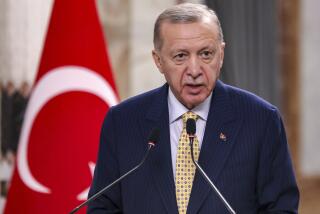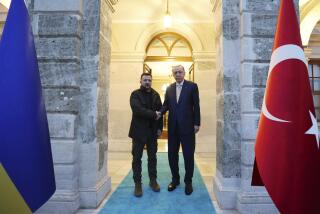Turkey OKs Offer for Membership in European Union
- Share via
HELSINKI, Finland — With a nudge from the United States, Turkey early today put economic promise ahead of national pride by accepting an invitation to European Union membership that might ultimately scuttle its disputed claims to Cyprus and several Aegean islands.
At first, Turkish officials balked at the terms set out by the rich Western alliance for the membership it sought 13 years ago, with one diplomat saying the attached conditions meant “selling out Cyprus.”
But rejection of the offer would have isolated Turkey and its 65 million people from the European common market for years and likely would have weakened those in the government fighting for human rights improvements and better relations with neighboring countries.
In addition to winning over Turkey for a march toward membership that is expected to last more than a decade, the EU leaders invited six other states to begin negotiations early next year to eventually join their ranks: Romania, Bulgaria, Slovakia, Latvia, Lithuania and Malta. At a summit here, the EU leaders also endorsed a plan to set up by 2003 a European rapid-reaction force of up to 60,000 troops.
After Turkey signaled its dismay over the conditions of its EU candidacy, the bloc’s newly appointed high commissioner for foreign affairs and security, Javier Solana, flew to Turkey to rescue what the EU leaders here had expected to be the crowning achievement of the summit: An overture to Turkey--with its predominantly Islamic population--that would enhance the union’s image as a multicultural alliance embracing diversity as well as economic virtues.
Amid the diplomatic scurrying, President Clinton called Prime Minister Bulent Ecevit to congratulate Turkey on securing EU candidacy--a move clearly aimed at encouraging Ankara to accept.
After two hours of soothing over ruffled diplomatic feathers, a beaming Solana emerged from his talks with Ecevit in Ankara, the Turkish capital, to proclaim: “We have a ‘Yes.’ ”
What had most upset Turkey was a provision in the draft declaration of the summit, which continues today, that the EU review any outstanding territorial disputes within five years and “promote their settlement” through the International Court of Justice in The Hague.
The wording could be interpreted to mean Turkey would have to refer the disputes to the court by the end of 2004 if they are not resolved by then through discussions with Greece. The court, under U.N. auspices, would be likely to award control of Cyprus to Greece because Turkey’s seizure of the northern part of the island nation in 1974 has never been recognized as a legitimate right to sovereignty.
“The European Union is not imposing a deadline for resolving the issues but for reviewing them,” Ecevit said after his talks with Solana and the EU’s commissioner for enlargement, Guenter Verheugen.
“Turkey has been accepted on equal terms as all other candidates for full membership in the European Union,” he said. “This is a positive development. President Clinton rang me to congratulate me, to say this is a victory for Turkey.”
The Finnish hosts of the summit took pains to note that Solana went to Turkey to clarify details of the EU offer of candidate status--and emphasize that there would be “no bargaining” over the language of the offer.
Greek Prime Minister Costas Simitis had insisted even before Solana left for Turkey that the agreed language of the declaration was not open to negotiation. “We are not changing this text unless there are grammatical errors,” he said at a news conference after hailing the offered membership path as historic and the beginning of a new era of Turkish relations with Greece and other EU states.
Greece had previously been the stumbling block to Turkey’s admission to the membership process on equal footing with 12 other candidate states. One Turkish government official who discussed Ankara’s position on condition he not be named complained that he could see “the hand of Greece” in the declaration’s wording.
Conditions for Turkey’s accession to the common market are “the same criteria as applied to the other candidate states,” the draft declaration proclaimed. But the Turkish official described the offer as “a nicely packaged deal that offers the same terms” as those Turkey rejected two years ago, saying they placed its bid in a second-class status.
The declaration makes Turkish membership contingent on its “progressing toward fulfilling the political criteria for accession” on human rights and on the territorial disputes.
Despite possible setbacks on territorial disputes, EU candidacy is expected to strengthen those Turkish politicians, like Ecevit, who favor democratic reforms. Changes likely to be implemented as Turkey seeks to qualify for membership include abolition of the death penalty and the use of torture; stronger respect for freedom of speech and press; easing the role of the military in Turkish politics; and improving relations with neighbors, first and foremost with Greece.
Turkey’s 12-million-strong Kurdish minority had urged EU leaders to bestow candidate status on Ankara in hopes that it would lead to more autonomy and equal rights with the majority Turks. The Kurds also welcome the EU ban on capital punishment because their jailed leader, Abdullah Ocalan, has been sentenced to death for leading a 15-year battle for Kurdish self-rule that claimed more than 30,000 lives. The invitation to membership now makes it virtually impossible for Turkey’s leadership to endorse Ocalan’s execution.
Turkey and the other six new candidates for membership join Poland, Hungary, the Czech Republic, Slovenia, Estonia and Cyprus in the lengthy process of reshaping their laws and economies to conform to EU standards.
(BEGIN TEXT OF INFOBOX / INFOGRAPHIC)
The Issues for Turkey
Some of the issues Turkey may have to deal with before the European Union grants it membership:
* Adhering more strictly to human rights protocols in a country where torture is common.
* Increasing democracy in a society where dozens of journalists have been jailed for their writings.
* Reforming the role of a military that has staged three coups and still dominates government.
* Improving relations with Greece and making progress toward a solution to the divided island of Cyprus.
*
The Cyprus Issue
Turkish troops invaded northern Cyprus in 1974 in support of ethnic Turks. The invasion was triggered by a coup attempt by ethnic Greeks seeking the island’s union with Greece. Turkey has held the northern half of Cyprus ever since.
*
Source: Times staff and wire reports
*
Special correspondent Amberin Zaman in Ankara contributed to this report.
More to Read
Sign up for Essential California
The most important California stories and recommendations in your inbox every morning.
You may occasionally receive promotional content from the Los Angeles Times.














